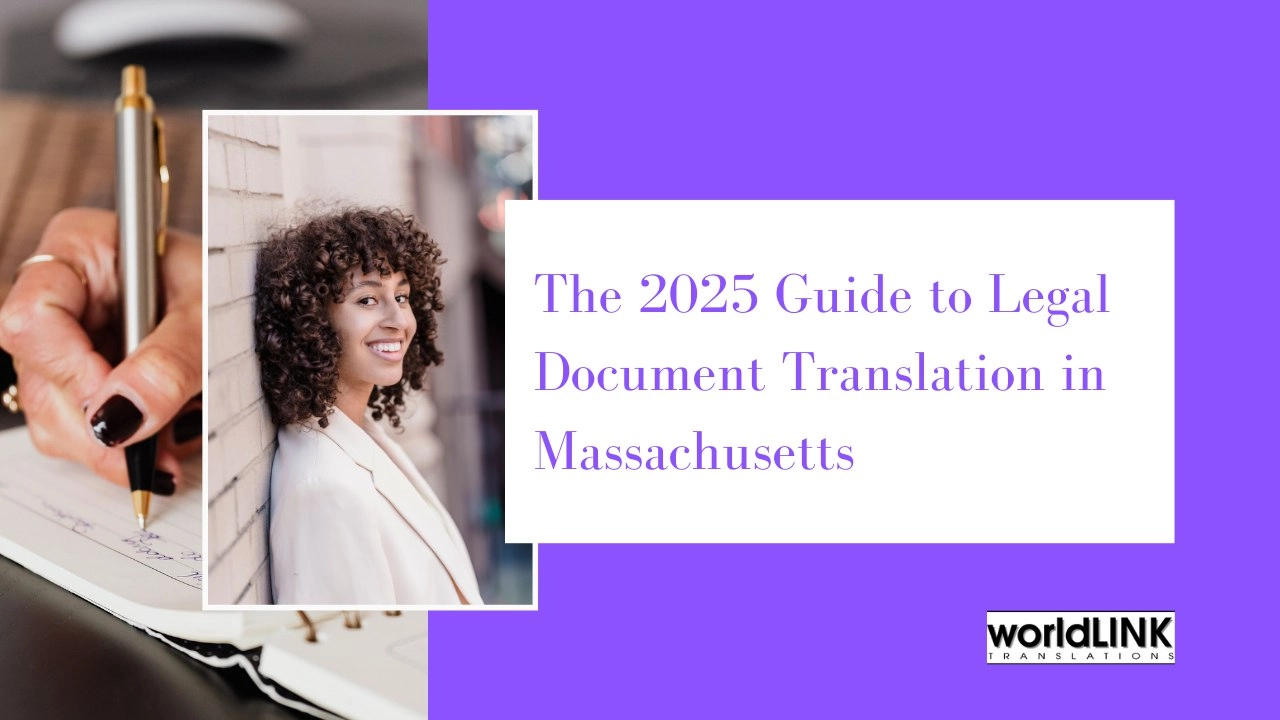When it comes to legal matters, precision isn’t optional; it’s required. That’s why legal translation services Massachusetts businesses and law firms rely on must deliver more than just word-for-word accuracy. They must meet state and federal standards, maintain confidentiality, and ensure documents hold up in court.
WorldLink understand the stakes. From contracts to immigration papers, one error in translation can mean delays, penalties, or even case dismissals. This 2025 guide explores the essentials of certified legal translators, compliance requirements, and how Massachusetts-specific rules affect your documents.
What Legal Documents Often Require Translation
Legal translation covers a wide range of documents. In Massachusetts, these often include:
- Immigration records (birth certificates, visas, green cards)
- Court filings (pleadings, evidence, judgments)
- Business contracts and agreements
- Financial statements for litigation or compliance
- Employment documents and HR policies
Each of these requires a translator with not only language fluency but also legal knowledge to ensure accuracy. That’s where specialized legal translation services Massachusetts firms like WorldLink step in.
Certified vs. Notarized Translations: What’s Required?
One of the most common questions is whether you need a certified or notarized translation. While both carry authority, they serve different purposes:
- Certified Translation – A translator provides a signed statement that the translation is accurate and complete. This is often required for document translation for court and immigration cases.
- Notarized Translation – A notary public verifies the translator’s identity and signature, not the accuracy of the document. These are sometimes requested for business or academic purposes.
In Massachusetts, many courts and government agencies require certified translations over notarized ones, especially when legal outcomes are at stake.
Court Interpreting Services vs. Legal Document Translation
It’s easy to confuse interpreting and translation, but they serve different functions. Legal interpreting vs. translation comes down to timing and format:
- Interpreting is spoken and happens in real time, such as in court hearings or depositions.
- Translation is written and applies to documents submitted as evidence, filings, or client records.
For Massachusetts law firms, both services may be necessary, but when it comes to permanent records, legal translation services Massachusetts ensure documents meet strict requirements.
Need legally compliant document translation? Work with WorldLink for certified legal translators trusted by courts, businesses, and immigration lawyers across Massachusetts.
Massachusetts-Specific Legal Translation Standards
Massachusetts courts and agencies have strict requirements for translated documents. For example, translations submitted in immigration cases must follow U.S. Citizenship and Immigration Services (USCIS) guidelines, which mandate a signed certification of accuracy.
Similarly, document translation for court in Massachusetts must often be completed by certified professionals who understand both state and federal legal terminology.
Working with legal translation services Massachusetts providers ensures your documents meet these local standards. At WorldLink, we don’t just translate words; we adapt them to the legal context so your documents hold up under scrutiny.
Common Translation Pitfalls in Legal Cases
Even small translation errors can lead to costly consequences. Common pitfalls include:
- Mistranslating legal terms that have no direct equivalent in another language.
- Formatting mistakes that make documents inadmissible in court.
- Using non-certified translators, which can cause rejections by government agencies.
- Confidentiality breaches that put sensitive client data at risk.
By partnering with certified legal translators, Massachusetts law firms and businesses can avoid these risks and maintain compliance across all legal proceedings.
Final Thoughts: Accuracy That Protects Your Case
Legal translation isn’t just about language, it’s about accuracy, compliance, and protecting your case. Whether you’re handling immigration filings, contracts, or litigation documents, working with a trusted partner makes all the difference.
Ready to secure accurate and certified translations? Choose WorldLink for legal translation services Massachusetts clients rely on for precision, compliance, and peace of mind.
FAQs About Legal Document Translation
1. What legal documents require translation in Massachusetts?
Common documents include immigration papers, contracts, court filings, and financial records.
2. What’s the difference between certified and notarized translations?
Certified ensures accuracy with a signed statement; notarized verifies the translator’s identity.
3. When do I need legal interpreting vs. translation?
Interpreting is spoken in real time; translation applies to written documents for court or agencies.
4. Why do Massachusetts courts require certified translations?
They provide an official guarantee of accuracy, making documents admissible in legal proceedings.
5. How do I avoid mistakes in legal translation?
Hire certified legal translators who specialize in Massachusetts law and compliance standards.

